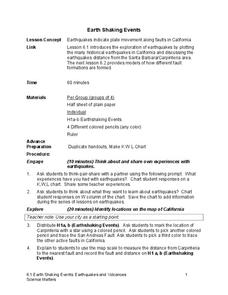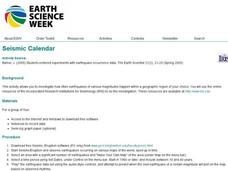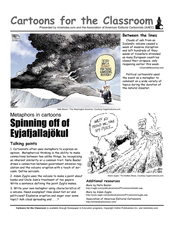Science Matters
Earth Shaking Events
The world's largest measured earthquake happened in 1960 in Chile, reaching a terrifying 9.5 magnitude on the Richter Scale. The second lesson in the 20-part series introduces earthquakes and fault lines. Scholars map where previous...
Science Matters
Fault Formations
The San Andreas Fault moves about two inches a year, approximately the same rate fingernails grow—crazy! The third lesson in the series allows for hands-on exploration of various fault formations. Through the use of a Popsicle stick,...
Science Matters
Spaghetti Fault Model
Does increasing the pressure between two moving plates provide a stabilizing force or create more destruction? The hands-on lesson encourages exploration of strike-split fault models. The sixth lesson in a 20-part series asks scholars to...
Science Matters
Earthquake Preparedness
Forty-five states and territories in the USA are at moderate to very high risk of earthquakes. The discussion-based lesson covers what to do before, during, and after an earthquake. The 14th lesson in the series includes how to prepare a...
Science Matters
Slip Sliding Along
The San Andreas Fault is the largest earthquake-producing fault in California. In the seventh lesson in the 20 part series, pupils create maps of California, focusing on the San Andreas Fault system. The comparison of where California is...
Science Matters
Richter Scale
The 12th lesson in a series of 20 opens with a demonstration of exponential functions using pasta. This concept is connected to the Richter Scale, which is also an exponential function. Scholars compare the exponential scale that...
Science Matters
A Model of Plate Faults
The San Andreas fault is one of the longest fault zones in the world. In a series of 20 lessons, the fourth lesson has pupils use a paper model to recreate various types of plate faults. Each is held in position then drawn into a science...
Science Matters
Wave Watching
Seismologists use the direction and arrival times of p waves and s waves to determine the distance to the source of an earthquake. The engaging instructional activity has students line up to form human waves. Through different movements...
Science Matters
Finding the Epicenter
The epicenter is the point on the ground above the initial point of rupture. The 10th lesson in a series of 20 encourages scholars to learn to triangulate the epicenter of an earthquake based on the arrival times of p waves and s waves....
Science Matters
Earthquake Building/Shaking Contest
Japan is one of only a handful of countries that constructs buildings that are almost earthquake proof. The 13th lesson in the 20-part series challenges scholars to build structures to test against earthquakes. With limited materials and...
Curated OER
Volcanic Wrath
Students observe volcanic action using an internet Web site of satellite photographs. Stuents create a portfolio of observable features.
Curated OER
ESL Natural Disasters Matching Worksheet
In this ESL natural disasters instructional activity, students examine small pictures. They match the pictures with the words that name them such as an avalanche, a hail storm, a drought, and a volcano.
Curated OER
Earth Science Lesson Plans - The Hadean
Fourth graders review the Clock of Eras and learn about The Hadean. In this eras lesson, 4th graders study the characteristics of the first time period on the Clock of Eras; The Hadean. They watch a demonstration of a volcano model.
Curated OER
PLATE TECTONICS WITH AN ORANGE
Young scholars explore the concept of plate tectonics. They experiment to prove and explain plate tectonics.
Curated OER
Tracking Current "Earth" Events
Eighth graders utilize Internet research skills, and practice their communication skills by presenting their research to the clas. They actively consider the types of hazards for humans associated with Natural Disaters and ways that...
Curated OER
Living With the Heat: The Ring of Fire
Students investigate the planet Earth's infamous ring of fire and the life that thrives from it. In this ocean environment lesson plan, students investigate hydrothermal vents and how organisms thrive off their heat. Students complete...
Curated OER
Seismic Calendar
Students discover how often earthquakes happen in a region of their choice. In this science lesson, students use online resouces to help them do their investigations. Students make their own map of their region and show how many...
Curated OER
Using My Nasa Data To Determine Volcanic Activity
Students use NASA satellite data of optical depth as a tool to determine volcanic activity on Reunion Island during 2000-2001. They access the data and utilize Excel to create a graph that has optical depth as a function of time for the...
Curated OER
Cartoons for the Classroom: Spinning off of Eyjafjallajökul
In this current events worksheet, students analyze a political cartoon about the eruption of Eyjafjallajökul and respond to 3 talking point questions.
Curated OER
Mean Meadian and Mode
Students apply central tendencies to given data. In this statistics lesson, students calculate the mean, median, and mode as it relates to their data. They collect data and graph it while identifying the way the numbers are ordered.
Curated OER
Metric System
Students solve problems using the metric system. In this algebra lesson, students convert between the metric system and the Imperial system. They use these two systems to solve real life problems.
Curated OER
Living With Disaster
Third graders identify and interpret natural disasters and act as experts to determine where the best location for a new farm would be. Students conduct research on an issue given as it relates to their area of expertise. Students...
Curated OER
Uses of Pumice
In this pumice worksheet, students read about how pumice if formed and the different uses of pumice. Then students complete 4 short answer questions
Curated OER
Extinction of Dinosaurs
In this dinosaurs worksheet, students review the different theories that scientist believe may have led to the extinction of the dinosaurs. This worksheet has 18 fill in the blank questions.
Other popular searches
- Types of Volcanoes
- Volcanoes and Earthquakes
- Shield Volcanoes
- Erupting Volcanoes
- Composite Volcanoes
- Internet Research Volcanoes
- Volcanoes Earthquakes
- Caribbean Volcanoes
- Ice Land Volcanoes
- And Volcanoes
- Spanish Volcanoes
- Three Types of Volcanoes

























